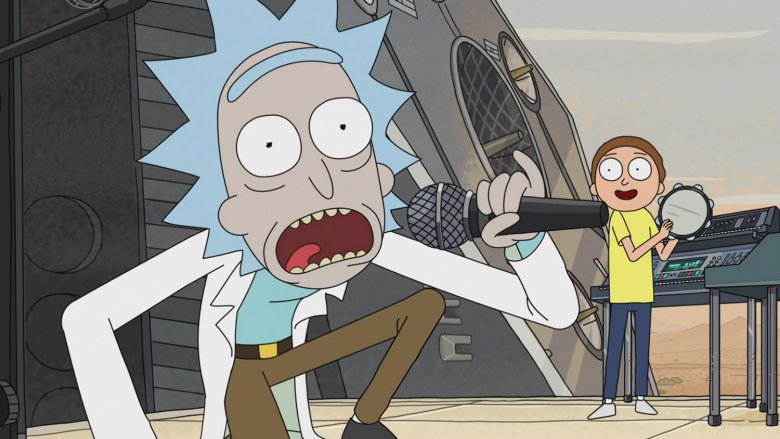The Inspiration Behind Rick And Morty Explained
Rick and Morty is a genuine cultural phenomenon, one that fans of the Adult Swim animated series simply can't seem to get enough of. The interdimensional adventures of mad scientist and "smartest man in the universe" Rick Sanchez and his extremely put-upon grandson Morty keep viewers on their toes (and laughing their butts off) with every episode, but just how in the heck did creators Dan Harmon and Justin Roiland come up with the idea for the show in the first place?
The answer lies in Channel 101, a short film festival which was the brainchild of Harmon. Speaking with the Los Angeles Times in 2014, Roiland recalled how he used to submit his own animated shorts to the festival — horrifyingly vulgar shorts which he crafted essentially for the purpose of screwing with the festival's audience.
"The original concept was just me screwing around," Roiland said. "I would go through phases in my involvement with Channel 101 where I would make stuff that was kind of intended to just shock people — a lot of screaming and people covering their eyes, groaning. This was one of those things. It started just for me, doing these two voices, really bad impressions of Doc and Marty from Back to the Future."
The (extremely NSFW) short that Roiland submitted in 2006: The Real Animated Adventures of Doc and Mharti, which features crudely-drawn renditions of the two iconic characters as they use Doc's time-traveling DeLorean to attempt to keep Mharti's kite from getting stuck in a tree. Unfortunately, the pair keep running into problems — and each problem requires the same ridiculous solution, one which we can't rightly go into detail about here.
It's easy to see how Doc and Mharti's character design, rough as it may be, was a precursor to the design of Rick and Morty — but it's even easier to hear the influence. Roiland's vocal performance as Doc is very, very close to the voice he now uses for Rick, from the halting, hesitating manner of speech right down to the burps which interrupt every other sentence (although we don't remember anything about Doc Brown being an alcoholic from our many viewings of the Back to the Future series). When it comes to Mharti, though, the performance isn't just similar — it's virtually identical. (The first words the character utters in the short are even a very Marty-esque, "Aw, man!")
Roiland went on to explain to the Times that while he was ostensibly just messing around for the two weeks it took him to create the short that would become the basis for Rick and Morty, he ended up developing an unreasonable level of attachment to it, and hoped against hope that Channel 101's festival goers would take to it. "Some of the raw energy behind the voice performances is sort of still intact, especially for Rick," he said. "That's the beginning of it. And me sort of falling in love with it over the short period of time I made it... by the time I was finished, I really had grown to like it. I was hoping the audience would [as well]. I had very little hope that they would because of the content, but I really did have this energy to continue telling stories with these two guys."
That much is now clear, but Roiland's idea had to sit on the back burner until his friend Harmon — who, of course, had been a big fan of the short — entered into talks with Adult Swim to produce a half-hour animated series, but found himself bereft of ideas. "I knew I wanted to work with Justin if I was going to work at Adult Swim because, the truth is, my sensibilities left to their own devices are pretty bad," Harmon told the Times. "I'm not a huge animation guy by nature... And so I thought about Justin because he is the Adult Swim brand. He is the target for a lot of their stuff. And he's also, like me, really passionate about story and franchise."
Harmon continued to explain that when he came to Roiland for help, his buddy immediately remembered the Doc and Mharti short, suggesting it as a jumping-off point for what would eventually become Rick and Morty. "[Roiland] mentioned these... [vandalizations] of Doc Jones and Marty McFly that he had done to get the steam off of his chest from a long time ago. Every time I watched them, I always found myself laughing hard. It was because the person behind them was doing something important to themselves. It was punk rock," he said. It didn't matter if it sounded enough like Mozart to register as proper music, what matters is the humanity behind it... What excited me about it was Justin was always laughing and having a great time with these characters. I think we wrote the pilot script in six or eight hours."
It's bizarre, yet somehow fitting, to think that if Roiland had not gotten it into his head to basically amuse himself with the crudest, most inappropriate take on Back to the Future he could think of, we would have no Rick and Morty. Maybe one day, one of the series' infamous "Interdimensional Cable" episodes will show us an alternate reality where the hit series sprang from a different family-friendly inspiration; E.T. the Extra-Terrestrial, perhaps, or The Goonies. We're just thankful that in our universe, Doc Brown and Marty McFly were there to give Roiland's twisted brain the inspiration he needed — and plant the seed for one of the most awesome animated shows of all time.
